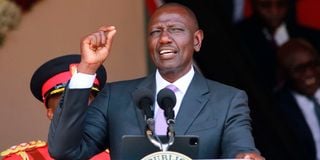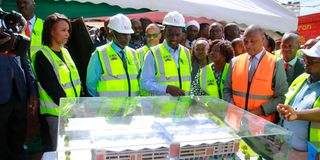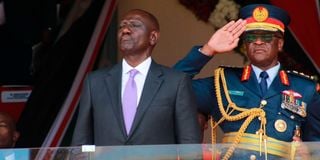President Ruto's leadership style rattles his allies

President William Ruto delivers his speech during the 60th Madaraka Day national celebrations at Moi Stadium in Embu on June 1, 2023.
Claims of high-voltage phone calls ordering government officials or politicians and making off-the-cuff policy pronouncements with huge implications have lifted the lid on President William Ruto’s hands-on style of leadership that is quickly rattling some of his allies.
True to form, on Friday, the President said he had directed parliamentary committees to review clauses on taxing content creators.
Political associates and technocrats in the Kenya Kwanza administration paint the picture of a President in full control of operations in his administration. While some characterise this as being hands-on and decisive, others say it is peppered with meddling and threats that make it hard for officials to independently do their jobs.
His style of leadership is quickly morphing into a one-man show, where he appears to micro-manage every policy decision, including in institutions that should ordinarily run independently.
According to sources, who spoke in confidence, the approach is quickly replacing the laid-back, easy-going — but often described as reluctant, and not on top of things — leadership style of his predecessors, Uhuru Kenyatta and Mwai Kibaki.
The latest display of this ‘one-man show’ side of the President was on Friday when he suggested he had unilaterally asked Parliament to drop a tax proposal currently undergoing public participation.
While presiding over the National Drama Festivals gala show at State House, Dr Ruto appeared to usurp the role of Members of Parliament and the public that had been submitting views by revealing he had told the National Assembly’s Finance and National Planning, and the Information Communication Technology committees to review tax proposals on online content after protests.
“I know there is a proposal in this year’s budget on digital content, and creators are making a statement. I have told the ICT and Finance committee to work on it. Let’s give them a bit more space,’’ said President Ruto.
The tax proposal is contained in the Finance Bill, 2023 which is currently undergoing public participation in Parliament.
In private, some officials have largely described Dr Ruto as being a keen listener, who gives advisers and technical brains time needed to explain points.
Another close ally and lawmaker says Dr Ruto, unlike his predecessor, rarely delegates duties. Both spoke to us on condition of anonymity.
But some of these traits have rubbed others, both government officials and political figures, the wrong way.
In a circular dated April 3, Chief of Staff and Head of the Public Service Felix Koskei directed corporation boards to seek clearance with his office before appointing or renewing appointments of chief executive officers of their respective parastatals.
“Ministries and State Corporations are reminded to strictly adhere to the directive to this office’s concurrence prior to appointment/re-appointment of chief executive officer,” Mr Koskei, who acts on behalf of the President, said in the circular.
State Corporations Act
According to the State Corporations Act and Mwongozo, boards are mandated to pick chief executives.
The boards are mandated to oversee the overall strategy and approve significant policies of the parastatals.
A chairman of a parastatal who spoke off record said they are operating under tough conditions following Mr Koskei’s circular, which also ordered them to stop inspection projects by the parastatals.
The official gave the example of Kenya Medical Supplies Authority (Kemsa) where the entire board was fired following the mosquito net scandal.
“We have been directed not to get involved in the procurement and inspection of projects. So at what point are we liable whenever the misappropriation of funds occurs? It is purely an attempt by some individuals to run the parastatals remotely,” said the board chair, who sought anonymity.

President William Ruto views a market model as he launched the construction of the Embu modern market in Embu County on May 26, 2023. He was in the town to launch several projects ahead of Madaraka Day national celebrations, which will be held in the town.
Multiple sources within the government told Sunday Nation that the leadership style of President Ruto could see qualified Kenyans quit their jobs out of pressure and tight supervision.
“There is no room for mistakes or sleeping on the job. The President personally calls and inquires on the happenings in various dockets and regularly asks for real-time updates.”
Recently, the President disclosed that he personally engaged the principal secretaries before the budget estimates were released.
Azimio la Umoja-One Kenya leader Raila Odinga has publicly faulted Dr Ruto’s leadership style, especially the sacking of the Kemsa board and chief officer. Mr Odinga said Dr Ruto should allow his ministers to make policy decisions touching their ministries.
“A government should be administered as such, with ministers entrusted with specific responsibilities. Why do we not see ministers addressing key policy matters? It is the President who is making important policy decisions. If there is a major policy statement in Education, it should come from the Minister for Education,” said Mr Odinga in the wake of the Kemsa sacking.
State capture
Mr Seth Panyako, the former United Democratic Alliance (UDA) deputy vice chairperson in charge of programmes who quit in a huff last week over a supposed phone call he got from the President, wants the Head of State to keep off State corporations.
“There is true State capture and I have witnessed it. I request you (President) to remove your hands from State corporations. Once people have been appointed, leave them to function, as established and stipulated in States Corporation law,” he said.
Sunday Nation could not independently verify some of the allegations.
Similar views were shared by ODM chairman John Mbadi and Jubilee Secretary-General Jeremiah Kioni, who described Dr Ruto’s style of leadership as pure State capture.
“I don’t know if it is even a style of leadership. What he does defies all the traits of good governance. We have seen major policies around university [education] being done at State House. He should let his ministers work,” said Mr Mbadi.
He added, “In a nutshell, Ruto needs to be called back to order because he is holding the country hostage by this kind of leadership. He cannot get to the level where he is the one to decide on which cleaner to be hired in which office. When you have a president making calls to influence appointments in parastatals. He needs to give his officers space to work. The way he is operating is too casual,” he said.
Mr Kioni claimed that those working in the Kenya Kwanza administration were operating in a difficult work environment.
“What we are seeing now is real State capture. All institutions report to State House and not to their line ministers. And anybody who appears to give their alternative views is shown the door. Ruto does not listen to anyone but himself,” said Mr Kioni.
Gen Ogolla appointment
In a recent interview with television stations, Dr Ruto appeared to suggest that he has absolute powers in the appointment of the Chief of Defence Forces and that he had several options other than Gen Francis Ogolla, whom he accused of attempting to influence the presidential election outcome.
“General Ogolla is among the people who went to Bomas of Kenya to try and overturn my victory but because when I looked at his CV, he was the best person to be General," said Dr Ruto.

President William Ruto and Chief of Defence Force Francis Ogolla during the 60th Madaraka Day national celebrations at Moi stadium in Embu on June 1, 2023.
He added, "I could have appointed anybody. I had I think 10 choices, people say that I appointed Ogolla because he was the deputy CDF, but that is not the case. I made the decision consciously and I made it against the advice of many people."
But according to the rules introduced by retired Chief of General Staff Gen Daudi Tonje — popularly known as the Tonje Rules — the position of the CDF is rotated among the three services of Kenya Army, Kenya Air Force and Kenya Navy.
Gen Robert Kibochi was from the Kenya Army and his predecessor, Gen Samson Mwathethe, was from the Kenya Navy. This means that Dr Ruto had no choice but to pick the next CDF from the Kenya Air Force. It means the rule limited his choice between Gen Ogolla and Lt.Gen. Mohammed Badi, who are the only Air Force veterans who had attained the rank of Lieutenant-General.
Also, for efficiency, the President is reported to have transferred the government printer from Harambee to State House. This move, his handlers argue, is to ensure government communications are not delayed.
Further to demonstrate control, the President recently ordered the valuation of land function be transferred to the Lands Ministry from the National Land Commission (NLC) over graft claims.
However, the move to strip NLC of its role received mixed reactions, with some industry players threatening to sue the President for violation of the law.
Legal experts have questioned the President’s authority to issue such orders, especially after a Supreme Court decision gave the valuation and compensation powers to NLC during the Jubilee government’s first term after tussles with the Ministry of Lands.
But Attorney General Justin Muturi recently told the Nation that he sees nothing wrong with the plans for changes in the lands sector.
“A proposal to amend or make a law cannot be deemed as interference. Even you can make such a proposal,” said Mr Muturi
Also, the President quietly held a meeting with Kenya Medical Practitioners, Pharmacists and Dentists Union (KMPDU) officials on the strain in the Health sector where he discussed the reversion of functions assigned to counties to the national government without consulting governors.
Similarly, in February, when President Ruto received the second interim report of the Presidential Working Party on Education Reforms (PWPER), he expressed his dissatisfaction, forcing the team to amend their report to suit his demands.
It is reported that the President was not convinced that the proposals, especially on university funding, are sustainable and therefore asked them to rethink them before making their final proposals.
Dr Ruto would later hold a meeting with university vice-chancellors where he came up with a new model of school fees in the institutions.
There have also been questions about Dr Ruto’s commitment to respect independent institutions to operate without interference, especially after he fired former Directorate of Criminal Investigations (DCI) boss George Kinoti, with whom they had fallen out in the run-up to the elections.
But Dr Ruto insists that Mr Kinoti broke the law and ran the DCI as a political tool to target opponents of Mr Kenyatta’s rule and needed to go.
“There was a container in the Nairobi area where people were being slaughtered, in a police station. I mean how did we end up there? What kind of rogue institution was that? That is why I fired that Kinoti man,” said Dr Ruto during an interview.
The National Police Service Act stipulates that the DCI boss can only be fired if found guilty after a petition is filed with the National Police Service Commission.
The only grounds for dismissal—with the NPSC expected to give a full hearing, then recommend to the President—is a serious violation of the Constitution; gross misconduct; physical or mental incapacity; incompetence or bankruptcy.






